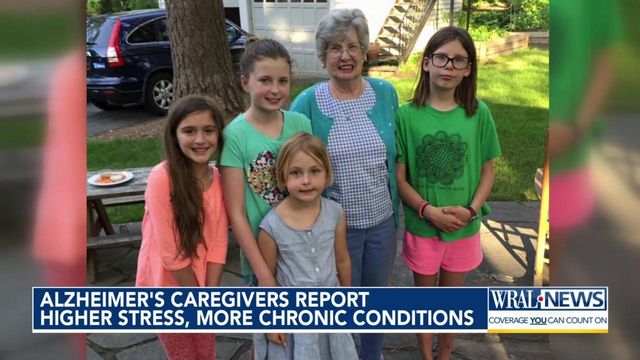Caregivers report higher rates of chronic conditions after caring for someone with Alzheimer's
Around 59% of caregivers for Alzheimer's patients in North Carolina reported having at least one chronic condition, compared to caregivers for non-dementia patients.
Posted — UpdatedOver 210,000 of them are North Carolinians.
59% of caregivers for Alzheimer’s patients in North Carolina reported having at least one chronic condition, compared to caregivers for non-dementia patients. Chronic conditions included stroke, heart disease, cancer, and diabetes.
“Here in North Carolina, we have over 370,000 caregiving for these loved ones,” said Alzheimer’s Association Regional Leader Katherine Lambert. “We’ve always known caregiving for any disease but particularly Alzheimer’s and dementia is extremely taxing.”
41% of caregivers in North Carolina surveyed reported they were depressed and 74% said they were “somewhat concerned” about maintaining their own health. 18% additionally ranked their physical health as “frequently poor.”
“What we hear from a lot of caregivers is that they are so in the emotional and physical reality of caregiving for their loved one that sometimes their own health concerns take a back-burner to that,” said Lambert.
Caregivers reported cost as their biggest stressor.
According to the Alzheimer’s Association, the cost of care for Alzheimer’s patients countrywide is projected to hit $360 billion this year. That is an increase of $15 billion from last year.
North Carolina caregivers are estimated to have provided 723 million hours of unpaid care for loved ones in 2023, valued at $10.9 billion.
Dr. Scott Robert specializes in internal medicine and has helped treat Alzheimer’s patients for more than two decades.
He told WRAL News he started seeing the disease through a new perspective after his own parents were diagnosed with dementia on the same day in 2018.
“For me, I had a very objective way of looking at patients. Even in a simple conversation I could realize, ‘Oh there’s signs here that if they don’t already have dementia they’re probably going to be diagnosed with it.’ But for your parents, you don’t want to wish that on them,” Robert said. “It’s denial.”
Robert and his brother both helped make caregiver decisions, but as the closest-living child to their parents, Robert took on much of the day-to-day burdens.
“My parents’ doctors didn’t ask anything extraordinary of me but they asked, ‘Hey let’s get an MRI or bring them to this appointment,’ and what I realized is how much work that is,” said Robert.
He continued, “Simply me living in Durham, them living in Cary, me going to pick them up, traveling back to Durham, going to an appointment, driving them back and me home – that was a 6 or 8 hour day.”
Robert said the realization of the toll caregiving takes on the entire family has now shifted the way he helps treat his own patients.
“I’m a lot more sympathetic and I try to make things a lot more efficient for them if I can,” the doctor explained. “If there’s something I can do to get one more test done before they leave the hospital, I know that will save them time and stress and effort.”
Robert said he wasn’t surprised to see the Alzheimer’s Association 2024 report showed caregivers reported such high feelings of stress.
“The amount of stress it put on my marriage and also even my relationship with my brother who was also functioning as a caregiver… I mean the simplest tasks took a lot of effort to get them done,” he said.
The doctor now helps others navigate stress after diagnoses by working closely with the Alzheimer’s Association in the Raleigh-Durham area.
Other stressors for caregivers included: coordinating with multiple doctors, making appointments, being able to take breaks, and finding doctors.
The 2024 report also showed caregivers for Alzheimer’s patients reported higher instances of work-related changes compared to other kinds of caregivers.
57% of Alzheimer’s caregivers reported going in late or leaving work early to provide care compared to 47% of other caregivers.
9% reported quitting their jobs entirely to provide care, compared to 5% of other caregivers.
“The big takeaway from this year’s special report is that dementia caregivers want and need help navigating the complex health care system and accessing community-based services,” said Lambert.
The Alzheimer’s Association said 97% of caregivers reported navigation services would be helpful including a 24/7 helpline, aid in coordinating communication between specialists and help with understanding a loved one’s condition.
The association also reported 60% of health care worked believe the U.S. health care system “is not effectively helping patients and their families navigate dementia care.”
The Alzheimer’s Association does offer support groups. More information about the organization’s online community and upcoming events can be found on the Alzheimer’s Association website.
Related Topics
• Credits
Copyright 2024 by Capitol Broadcasting Company. All rights reserved. This material may not be published, broadcast, rewritten or redistributed.






